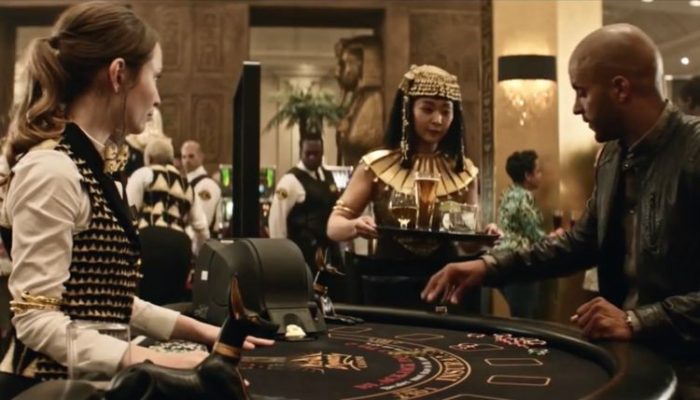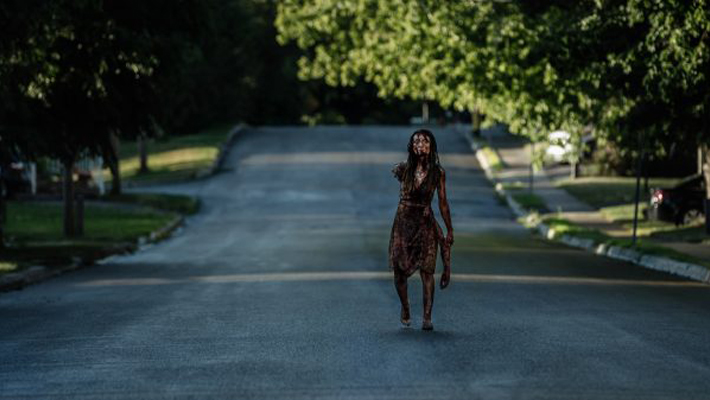Girls don’t poop. I think it started as a joke, though I can’t remember the first time I heard it said, what the context was, or if the speaker laughed. But like many winking, ironic statements, it houses a grain of sincerity; consider the old archetypes of traditionally masculine men. They swear and drink and often philander; they are flawed and often there is a celebration of those flaws within the collective concept of masculinity. But women. Women don’t poop. Women are quiet and polite; they are virtuous and selfless, and they stand by their men.

Laura Moon will, I suspect, be a polarizing character for many people, as she is fully realized in episode 4 of American Gods. She is introduced sleepwalking through a menial job dealing cards at a local casino. Her job is slowly being taken over by machines, right now a shuffling device making her less essential – not completely unlike Wednesday being phased out by Technical Boy. She goes home to an empty house, save the cat she leaves the tv on for. When she flirts with the absurdly handsome, charming hustler we know to be Shadow Moon, it feels more like she is experimenting with human interaction than genuinely engaging. Laura is stuck and Shadow is smitten. She gives into the temptation that many men and women have over the years, to believe that if someone loves you enough, it will fix you. And if nothing else, maybe you won’t feel so alone.
But another person can’t fix what’s rotten inside of you, and Laura’s own unhappiness does not dissipate in the light of Shadow’s adoration. She suggests and then insists they work together to rob her casino, and when it all falls apart, Shadow takes the fall. While he’s in prison, we know that Laura begins an affair with Robbie, and we see how toxic her personality can be on a weaker man. They die together, the way we knew they would, and Laura returns to a sort of life in time to save Shadow from Technical Boy’s lackeys. She loses an arm and ends up at Audrey’s for some basic reconstruction. What ensues is, simply put, one of the best scenes between female characters I have ever seen rendered to film, but more on that later. Laura attains the care of Mr. Jacquel (who we know to be Anubis, and whose judgment she was saved from in the moments immediately following her death) and Mr. Ibis, who will be extremely important later in the series. She owes Jacquel her life – not in an “oh hey, you saved me, I owe you my life” sort of way, in a literal “this is yours, I’m just holding onto it for now” way, not unlike Shadow owes his to Czernobog.

Laura’s an easy character to dislike, hate even. And you wouldn’t be wrong to feel that way. She is difficult and alienated; she makes terrible decisions and is reckless, selfish. She is not the archetype of a woman we have been taught to love. She’s not particularly strong, she isn’t overwhelmingly kind, she is aimless and rudderless. I’ve attempted, in sorting out my own perceptions of Laura and this episode, to separate the show’s incarnation of her from the version I know from the book and what I know she will become, a feat that is not without its challenges, but that is essential, as I don’t want my affection for the character she ultimately becomes in the book shading the character she is in the show. If that seems like an awful lot of equivocation, it’s because if we are plotting parallel Laura’s, by this point in the book, she is a cipher – mostly just a motivation for Shadow. Here, though, love her or hate her, Laura is her own. She has a story and a life and she can exist independently of Shadow. In fact, one of the biggest problems for their relationship is that she doesn’t know quite how to not exist independently. Laura is deeply and profoundly fucked up. Not in a way that readily evinces sympathy, so I say again, you are right not to like her. But I do. I like Laura, because her ennui feels familiar to me; the hopelessness you can carry around with you, even when everything seems to be going well. Even when you should be happy. I like Laura because she shits. Literally.
To return, as I promised a couple of paragraphs ago, to the scene between Laura and Audrey… Laura is voiding the embalming fluids from her body, so the first conversation Audrey has with her alive again best friend-turned husband seducer takes place with Laura on the toilet, pants around her ankles, and Audrey confused in the bathroom with her. It’s the kind of dark humor Bryan Fuller does so well; in addition to undercutting the intense horror of the situation and the lingering resentments, the interaction is a warped scene from some easy-breezy rom com between best friends. It’s a stupid but almost universally true generalization. Girls go to the bathroom together. Audrey and Laura could be any girls having an argument about boys in the bathroom together, except that one of them is dead and furiously shitting out formaldehyde. And thank god for the static sense of humor in the scene, because there is so much brutal, emotional honesty to the scene that it almost feels voyeuristic to watch. I don’t necessarily want to blow my “Most Improved Player from the Book” award yet, but Audrey is the front runner by a long shot. She wrenches sympathy and pathos from every self-loathing second of performance. All of the masks have been dropped between her and Laura now; frankly, she has a bare connection with Laura that even Shadow will never be able to challenge, because they have shared so much – too much in many ways, but that is often the magic of close female friendships.

I could say so much more about Laura; I feel weirdly compelled to defend her, not because she is likable or good, but because I think in a lot of ways she is human and she is sad and alone. It’s not simply that Laura doesn’t adhere to the qualities that traditionally endear and define female characters; it’s that it doesn’t feel like some sort of subversive inversion of those qualities, as often times these attempts to break away from the mold of the “good woman” do. Laura’s a mirror for anyone who ever hasn’t been able to explain why they’re sad, but know for certain that they are.
But it would be remiss not to put in a word about pre-prison Shadow Moon. It is a very clever bit of characterization and plotting that this playful, mischievous Shadow is not the one we meet at the beginning of the show. By introducing this version of him only after we know the somber, serious man with his head down, we better see the toll that prison has taken on him. He is almost unrecognizable in his joy; and we, of course, must lay much of the responsibility for the death of his happiness at Laura’s feet.
We zagged a bit off the forward trajectory this week, but hot goss around the water cooler suggests next week we will finally meet Crispin Glover and reunite with Media. I’ll see you then!
